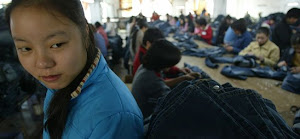Globalization and the Denim factories in China
Like no other film before, China Blue is a powerful and poignant journey into the harsh world of sweatshop workers. Shot clandestinely, this is a deep-access account of what both China and the international retailers don't want us to see: how the clothes we buy are actually made.
Following a pair of denim jeans from birth to sale, China Blue links the power of the U.S. consumer market to the daily lives of a Chinese factory owner and two teenaged female factory workers. Filmed both in the factory and in the workers' faraway village, this documentary provides a rare, human glimpse at China's rapid transformation into a free market society.—Blue frog Films, http://www.bullfrogfilms.com/catalog/china.html
While this film is primarily about the sweatshops of china, the film follows one girl, Jasmine, as she leaves her village town to work in a denim factory in the city. The factory that she works at is better than many of the others. The factory she is at has many clients and works based on individual orders placed by those retailers, other factories belong to one brand retailer, and no cameras are allowed in those factories, the film is able to find some employees of those factories willing to talk, cameras are snuck into the housing area and the interviewees are often in shadow and their voices manipulated to protect their anonymity, because just talking to the film crew is a violation of National Security Law. We are also introduced to Orchid who because she learned specialty sewing works (usually) less hours than Jasmine, by less I mean she usually only has to work the a 10-12 hour shift. Liping sews zippers and has a fake ID, because she is only 14 years old. Jasmine is put to work cutting loose threads and often work 8am until past midnight. Then of course there are the days when an order is due and she has to work a 16-20 hour shift. Life in the factory is hard. Jasmine assumed that the factory would provide meals, but she learned that was wrong. Her pay is also deducted for each gallon of hot water she needs, housing, and numerous fines, which can be deducted for something as simply as laughing or talking with a co-worker.
We are also introduced to the owner of the Lifeng factory; Mr. Lam. Mr. Lam is a former police chief turned factory owner who feels that a good slogan can motivate even the laziest of workers. Mr. Lam fully admits that as a police chief he had to work within certain boundaries but he says that in business “I will do whatever it takes to make money.” And he does, he lowers the pay rate and delays the payday over two months. And even then the workers are only paid after some gather around the upstairs offices and demand pay and do not report for work. Striking is illegal, however Mr. Lam has a deadline to meet and he offers to pay right after they ship the latest orders, which means another all night of working. Before we place all of the blame on Mr. Lam though, we must remember that earlier he had a meeting with a British retailer who threatened to get his denim somewhere else unless the price was lowered. Mr. Lam then agreed to make the jeans for $4-$4.1 dollars. The retailer must know that only one dollar of that goes to labor cost and it doesn’t take a math genius to know that the workers are not being paid the minimum wage and overtime does not even enter the conversation. When describing the rules of the factory Mr. Lam explains that his workers come from the villages and are backwards and illiterate (despite the fact that the bulk of the dialogue is a voice over narration of Jasmines journal) and you cannot simply teach the employees a work ethic. “It is beyond them.” Mr. Lam also perpetuates stereotypes of the poor villagers (Hillbilly defense, anyone?) when he insists that the migrant workers are generally unlawful and would “kill for a few dimes.”
Inspector Dr. Liu Kaiming speaks frankly of how easy it is for the factories to get around the inspections. First the factories are never get a surprise inspection, they have time to prep and teach their employees what to say. The factories also have two sets of time cards, the real ones the workers use and fake ones security guards enter to show a lower amount of hours worked per week. Also the employees are forced to sign a different pay stub that reflects a higher wage, or they will not get their (much lower) pay. Dr. Kaiming also explains that the inspections are just a game to retailers; they only do them to reassure their consumers not to actually improve conditions of the factories. Yang Ching, a former factory manager, who was fired after she became pregnant, backs up Dr. Kaimings findings by describing how she herself did those things to her workers.
As Chandra Mohanty explains in “Feminisms Without Borders” the ideology behind gendered work is a huge part of how and why these factories, the government, and the retailers are able to get away with this horrible violation of human rights. Dr. Kaiming asserts that the use of women, village women, is beneficial to the factory owner because of their ‘docile’ nature, and the fact that most of them are working to send money home. A hint of violence is shown in the film during the confrontation between the female worker sand Dr. Lam (when they refused to go back to work). Mr. Lam says to not work is to be in a fight with him, Orchid calls out “do you mean you will beat us?” The question is never answered and Mr. Lam quickly works out the compromise detailed above. I certainly felt that the threat of violence is used, even in Jasmines voice over we learn that resignations are rarely granted, that the boss would not let me leave, etc. The idea of violence being threatened is valid and a certain possibility. There is a postscript at the end of the movie that details the detention of the film crew, their interrogation and confiscation of some tapes and contact with Jasmine and the other workers was terminated. It is obvious that this problem is larger than just the factory, and Mr. Lam. What these large retailers have been allowed to do in this and other countries is deplorable and unlawful. People should not be shocked when realizing that this is just not one evil company, the wal-mart factories are mentioned, Levi, Jordache, Phat Farm, and other labels are clearly visible in certain shots. What corporate capitalist globalization has done to the factory workers for the sake of profits is inhuman.
Subscribe to:
Post Comments (Atom)







No comments:
Post a Comment